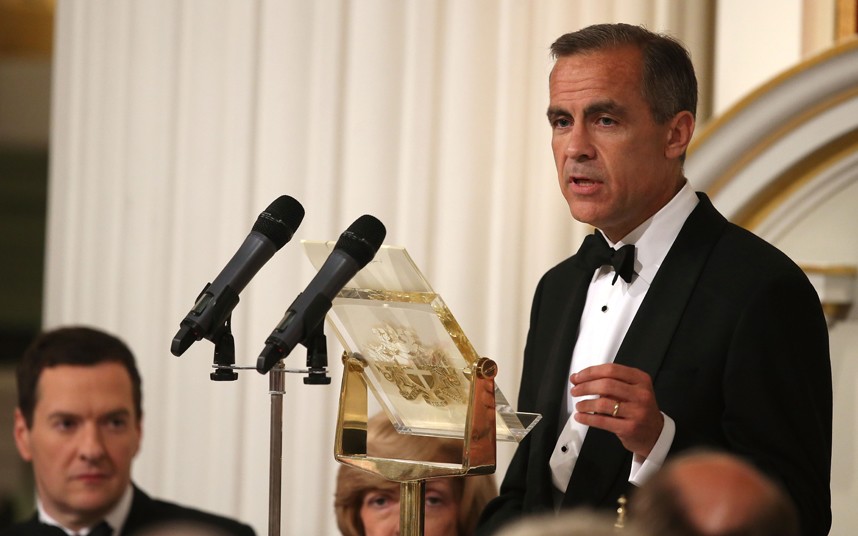
Mark Carney, Mansion House
10 June 2015
Photo: i.telegraph.co.uk
Dear Mr. Carney,
Thank you very much for the fine speech you gave at the Mansion House last night. You touched upon some very important and timely issues, concerning the behaviour of banks and other financial institutions. Late in the day, one might say, but, better late than never.
May I remind you of some of the things you said?
“Markets responsible for trillions of pounds of global trade were stained by excess, collusion and abuse and that ‘ethical drift’ had taken hold.”
“The age of irresponsibility is over.”
“Criminal sanctions should be updated, with market abuse rules similarly extended and maximum prison terms lengthened.”
“Though markets can be powerful drivers of prosperity, markets can go wrong.”
“Left unattended, they are prone to instability, excess and abuse.”
“Personal accountability was lacking, with a culture of impunity developing.”
“All these factors contributed to an ethical drift. Unethical behaviour went unchecked, proliferated and eventually became the norm."
You also noted that the Bank of England under your predecessor, “Lord King, failed in the run-up to the financial crisis because of its arcane and ambiguous rules and its inability to identify risks in the banking system. It failed to effectively control markets where abuse was rife.”
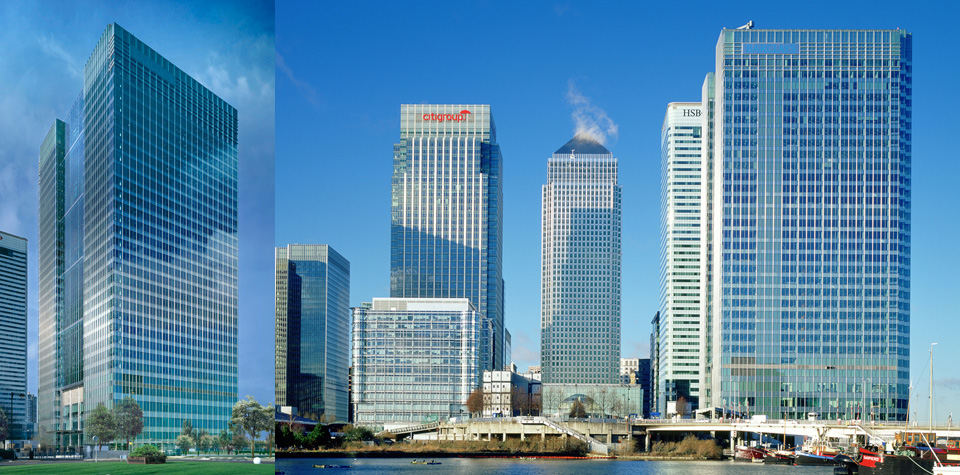
HSBC, Citi, Barclays- Canary Wharf, London
Photo: hok.com
I must say: “Well done, Mr. Carney!” But, big questions remain. Do you seriously believe that threatening the banks, frightening the bankers with prison sentences and such like, will make them act ethically for the common good? I am sure you do not. You are much wiser than that.
Perhaps a better path could be to engage the bankers and the business community with their true human values, the ones they believe in and practice at home, but, leave behind when they go to work.
Allow me to quote a passage from a speech I gave to a business association soon after the crash of September 2008. This, I hope, will clarify the point I am making.
“As an economist ladies and gentlemen, with a wide range of experience, I do appreciate the significance of economics, politics, trade, banking, insurance and commerce, and of globalisation. I understand the importance of wealth creation. But wealth must be created for the right reasons.
Values-led wealth creation for the purpose of values-led expenditure and investment is to be encouraged. We should applaud those who know “Why” and “How” wealth is created and, more importantly, when created “What” to do with it.
‘We have to build a better man before we can build a better society.’-Paul Tillich
“Try not to become a man of success, but a man of value” Albert Einstein
Today’s business leaders are in a unique position to influence what happens in society for years to come. With this power comes monumental responsibility. They can choose to ignore this responsibility, and thereby exacerbate problems such as economic inequality, environmental degradation and social depravation, but this will compromise their ability to do business in the long run. The world of good business needs a peaceful and just world in which to operate and prosper: A world that is truly for the common good.
However, in order to arrive at this peaceful and prosperous destination, we need to change the house of neo-classical economics, to make a fit home for the common good. After all, many of the issues that people struggle over, or their governments put forward, have ultimately economics at their core. As I mentioned before, the creation of a stable society in today’s global world is largely ignored in favour of economic considerations of minimising costs and maximising profits, while other equally important values are put aside and ignored.
Economics once again must find its heart, soul and spirit. Moreover, it should also reconnect itself with its original source, rooted in ethics and morality. Today’s huge controversy which surrounds much of the economic activity and the business world is because they do not adequately and appropriately address the needs of the global collective and the powerless, marginalised and excluded. This, surely, in the interest of all, has to change. The need for an explicit acknowledgment of true global values is the essential requirement in making economics work for the common good. Economics, as practiced today cannot claim to be for the common good. In short, a revolution in values is needed, which demands that economics and business must embrace both material and spiritual values.”
In short, Mr. Carney, we need more people and institutions whose moral values are not for sale. The following passage from an article I was recently reading amplifies my point:
“A Man for All Seasons is a well crafted play by Robert Bolt, a story of Sir Thomas More who was not only of accomplished nobility, but also a man of absolute integrity.
The play opens with these words: “Every man has his price! In money too... Or pleasure. Titles, women, bricks-and-mortar, there’s always something.”
As the play unfolds, King Henry VIII wishes to break up with Queen Catherine and marry Anne Boleyn. But the catch is this: the Catholic Church forbade divorce. And so King Henry VIII demands of his subjects the taking of an oath that will support him in his divorce. But there is a further problem.
Sir Thomas More, who is loved and admired by the common people, will not sign the oath. He is unwilling to submit, even at the king’s personal request.
His friends apply their personal charm and pressure, but he will not yield. He is stripped of his wealth, his position, and his family, but he will not sign.
Finally, he is falsely tried for his life, but still he will not succumb. They have taken from him his money, his political power, his friends, and his family — and will yet take his life — but they cannot take from him his integrity. It is not for sale at any price.
Integrity is choosing our thoughts and actions based on values rather than personal gains. A critical aspect of integrity, then, is the idea of a moral wholeness, or oneness, demonstrated by a consistency of thought, word and deed. Integrity is best described through four components: personal convictions (what we believe), stated values (what we say we believe), operational values (what we actually do), and ethical principles (what we should do).”
Now, Mr. Carney, allow me to say, what is at the heart of all this unethical behaviour.
As I am sure you know much better than me, if not all, but the great majority of these culprits have MBAs and PhDs from the so-called “prestigious/top” business schools and universities.
I put it to you: It is there that they learnt their market, business and financial values.
I am a “Recovered” academic and economist. I want to share with you a bit of my story. There are some “Recovering” and “Recovered” economists like me about. But we are usually not consulted. I believe, the world would be a better place if we were. We speak common sense for the common good. We do not use fancy words, useless jargons, mumbo-jumbos, and unrealistic econometric models, to complicate matters, to pretend sophistication and to mesmerise the policy makers. No need for all that. After all, in the wise words of Leonardo da Vinci, “Simplicity is the ultimate sophistication.” And these for sure, are what the world of business, economics and education needs most today.
Before anything else, please allow me to ask you two questions:
1- I know that, like me, you are an economist, so I want to ask you: Which Adam Smith do you believe in? This is an important question, as it shapes our ideas of what is right and what is wrong.
These days I am inspired by the “Real” and “True” Adam Smith, known the world over as the Father of Economics. We should recall the wisdom of Adam Smith, who was a great moral philosopher first and foremost. In 1759, sixteen years before his famous Wealth of Nations, he published The Theory of Moral Sentiments, which explored the self-interested nature of man and his ability nevertheless to make moral decisions based on factors other than selfishness. In The Wealth of Nations, Smith laid the early groundwork for economic analysis, but he embedded it in a broader discussion of social justice and the role of government. Today we mostly only know of his analogy of the ‘invisible hand’ and refer to him as defending free markets; whilst ignoring his insight that the pursuit of wealth should not take precedence over social and moral obligations.
Today, in universities, students are taught that the free market as a ‘way of life’ appealed to Adam Smith but not the importance he attached to the moral foundations of society. He neither envisioned nor prescribed a capitalist society, but rather a ‘capitalist economy within society, a society held together by communities of non-capitalist and non-market morality’. To Smith morality included neighbourly love, an obligation to practice justice, a norm of financial support for the government ‘in proportion to [one’s] revenue’, and a tendency in human nature to derive pleasure from the good fortune and happiness of other people.
He observed that lasting happiness is found in tranquillity as opposed to consumption. Today, in their quest for more consumption, people have forgotten about the three virtues Smith considered best provide for a tranquil lifestyle and overall social well-being: justice, beneficence and prudence.
I am only very sorry that, no one taught me these when I was a student of economics, so that I did not tell the truth about Adam Smith to my students when I became a lecturer; something that I very much regret and something that am trying hard to rectify, now that I am a “Recovering and Repenting” economist for the common good. At the end of the day, it is our honesty, humility and our struggle to seek the truth that will set us free and allow us to hold our head high.
2- Do you believe that there is a correlation between economics and ethics? This too is a vitally important question, as one of the most “prestigious” schools for the study of economics believes that there is no such correlation, according to a letter in The Times from Lord Kalms 8 March 2011:
Ethics boys
Sir, Around 1991 I offered the London Schoolof Economics a grant of £1 million to set up a Chair in Business Ethics. John Ashworth, at that time the Director of the LSE, encouraged the idea but had to write to me to say, regretfully, that the faculty had rejected the offer as it saw no correlation between ethics and economics. Quite. Lord Kalms, House of Lords
This, I am sure, Mr. Carney, goes a long way to explain the state of our world today - a world of progress and poverty. The continuing and deepening global economic turmoil is merely a symptom of a much larger moral, spiritual and ethical crisis. In short, the world is facing a crisis of values, a crisis of trust.
Now I wish to say a few words about trust and values. I believe these to be very relevant in your quest to tackle the banking crises.
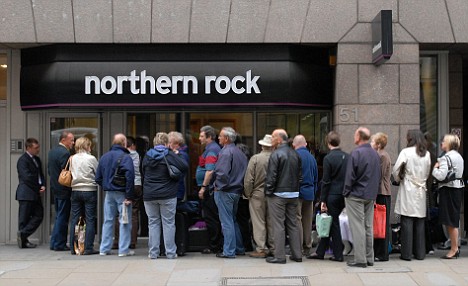
northern rock, the morning after the crash, customers queuing to withdraw their savings
Photo: i.dailymail.co.uk
First on trust:
Today in many parts of the world, the so-called market, and the values of consumerism, underpinned by the “Black Friday” values, have become increasingly dominant and are now seriously threatening our global future, both in terms of our care of the planet and in increasing societal rivalry and conflict. In the process we have lost trust in everything. This is why I believe your aim is so important. In the global society in which we now all live, it is essential for our common survival and wellbeing that we build cultures of trust, being prepared to take risks for the common good. Trust surely comes from the experience of a relationship - an in-depth experience - which by its nature is rooted in values that are not necessarily economic or monetary.
At the heart of such trust is an understanding that, in spite of our differences, we have our humanity in common. Archbishop Desmond Tutu speaks of ‘that African thing, Ubuntu’ – the notion that a person is only a person through other persons. A person with Ubuntu is open and available to others - all others - for we are incomplete without each other. Ubuntu echoes the insight of John Donne, that ‘No man is an island ….. I am involved in mankind’, and that was in the seventeenth century.
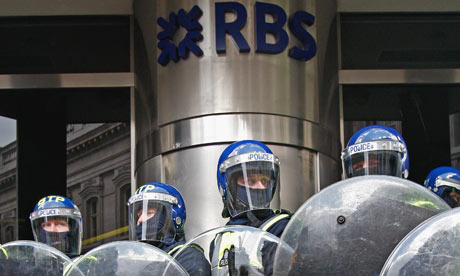
Riot police guarding the RBS building
RBS: The Bank that lost its time-honoured values
Photo: theguardian.com
This brings me to values:
In seeking to answer life's pertinent questions, and to understand the world better, we need to discover the world not just as it is, but also how it ought to be. Indeed, the deepest and most difficult questions with which we wrestle are problems of value — right and wrong, beautiful and ugly, just and unjust, worthy or unworthy, dignified or abhorrent, love or hatred, cooperation or competition, selflessness or selfishness, progress and poverty, profit and loss. Human beings have explored these many questions of value through religion, philosophy, the creation of art and literature, and more. Indeed, questions of value have inaugurated many disciplines within the humanities and continue to drive them today. Questions and conversations about values and valuing are fundamental to what it means to be human, but rarely become the subject of explicit public reflection.
As it has been observed throughout history, in action and thought, people are affected by a wide range of influences. Past experience, cultural and social norms are some of the most important ones. Connected to all of these, to some extent, are our values, which represent a strong guiding force, shaping our attitudes and behaviour over the course of our lives. Our values have been shown to influence our political persuasions; our willingness to participate in political action; our career choices; our ecological footprints; how much money we spend, and on what; and our feelings of personal well-being, contentment and happiness; as well as our relationship with others, with nature and Mother Earth, to mention but a few.
What are the values we need to build a better world? We all have our preferences and ideas.
We in the Globalisation for the Common Good Initiative (GCGI) have developed a model of what it would look like to put values such as love, generosity and caring for the common good into socio-political and economic practice, suggesting possibilities for healing and transforming our world.
To focus our minds, assisting us to see the big picture, I very much wish to offer for your consideration and reflection the values of the GCGI, which we hold very dearly.
We are What We Value
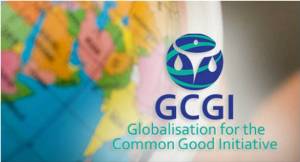
We value caring and kindness
We value passion and positive energy
We value service and volunteerism
We value simplicity and humility
We value trust, openness, and transparency
We value values-led education
We value harmony with nature
We value non-violent conflict resolution
We value interfaith, inter-civilisational and inter-generational dialogue
We value teamwork and collaboration
We value challenge and excellence
We value fun and play
We value curiosity and innovation
We value health and wellbeing
We value a sense of adventure
We value people, communities and cultures
We value friendship, cooperation and responsibility
In conclusion I would like to add a few words on the state of our business education, MBAs programmes, and why a change in direction is called for.
As I mentioned at the start of my letter, it is no secret that the great majority of employees at the banks and indeed elsewhere in business have MBAs from the so-called “prestigious/top” business schools. These schools shape and perpetuate the business culture and the aspirations of their graduates.
We have just experienced the most severe economic crisis since the Great Depression. There is plenty of blame to go around. As suppliers of ideas and talent to the business community, business schools need to accept some responsibility.
As noted by many, ideas and tools — exotic financial instruments, efficient market hypothesis, poorly designed compensation plans, models of corporate leadership that value leaders’ charisma over substance, an uncritical embrace of laissez-faire models, profit maximisation, cost minimisation, and much more—were/are taught to MBA and executive-education students without considering whether these ideas and tools would contribute to a firm’s long-term well-being or endanger the legitimacy of the global economic system and values.
Time is now to question the way business schools are ranked: Are they ranked according to how much “dosh” their “aspiring” graduates make, or according to how much they have contributed to the common good, making the world a better place? These are for sure the Big Questions.
In the post-financial and economic crises and meltdown, the issue of ethics and corporate social responsibility has taken on greater urgency and relevance. Business schools have an important part to play in this domain. Ethics is fundamental to coping with many of the challenges that will face corporate executives in the future, not least the impact of globalisation, which will throw up a number of leadership dilemmas. However, based on current evidence, the record of the business schools by and large is not a good one. Thus, the big question is: What can be done about it?
I firmly believe that, this will not come about, so long as we do not have a “Hippocratic Oath” for those teaching at the business schools. Ethics, morality, spirituality, and their incorporation into teaching, is too important to be left to a system not accountable to certain checks and balances, as well as points of reference and accountability.
Today, business education is much more scientific than it was in its early years. It has been made more rigorous by the rising influence of statistics, mathematics, IT and economics. I believe in analytics. Most organizations need more analytics. That goes without saying.
But, and indeed, as the current and persisting crises clearly demonstrate, it is a folly to pretend that analytics are a substitute for values and vision. Indeed, an over-reliance on analytics leaves managers poorly prepared to lead in moments when statistics obscure the full human dimensions of a choice.
The issue is not that MBA programmes haven't taught leadership and ethics and corporate social responsibility. They indeed have. But most do it poorly. As it has been noted by many observers, it seems that leadership courses tend to emphasize such things as social influence and public speaking, while ethics courses often focus on legal aspects. The moral, philosophical, spiritual, cultural, religious and civilisational aspects of ethics are by and large ignored. This leaves the connection between values, leadership and action much underdeveloped, least understood and most confusing to the students. Leadership entails thinking beyond the day's crises to focus on the longer term, the bigger picture, grasping the impact of decisions on broader constituencies, and sensing a responsibility that goes far beyond the immediate result of a decision, a responsibility far beyond profit maximisation, cost minimisation and the highest returns to the shareholders, for example. True leadership involves not merely grasping the larger ramifications of business decisions and merely considering the greater good of society, but of possessing values whereby the common good is seminal and truly cared about.
MBA students are too often unaware of the essence of ethical leadership, too unaware of the cultural and spiritual dimensions of ethics, too unappreciative of the role of institutionsand structures which govern, manage, and enable markets. For example, in workshops at a leading business school, students were asked to list the qualities that a successful business leader should possess. While vision and business acumen are invariably among the first qualities listed, honesty and responsibility for others emerge only after considerable discussion. Meanwhile, when asked about the characteristics they most value in human beings, compassion, generosity, kindness, sympathy, empathy, integrity, responsibility and the common good always appear at the bottom of the list. Likewise in leading business schools students are unable to trace the connection between ethics and culture, between well functioning markets and the larger social-political system.
In addition, an MBA education needs to be grounded in a realistic view of when markets work well and when they do not. Standard economics teaches that markets fail to be efficient in the cases of externalities, public goods, asymmetrical information, and a lack of competition. Even when efficient, markets are not able to provide an adequate social safety net nor are they able to provide for social or economic justice. Markets cannot work except in a legal, political, social, and ethical context.
In order to deal with the cases of market failure as well as issues of social and economic injustice, institutions and structures are created at the local, national, and global levels, to govern, manage, and enable the market, without which not only could markets not hope to work well, they likely could not even exist. What it means to be human, to live a good life, to find happiness, are not questions that can be answered by the market alone, or even by economics or business alone. MBA education must be infused with the values and sensibilities of human culture, philosophical and moral principles, as well as with a keen appreciation for the role of government and civil society.
We need to better prepare our students for a values-led leadership. This requires creating a deeper understanding of the difficult decisions they will face, often under enormous pressure. We must make them aware that these decisions will challenge their values, and that, consequently, they need to clarify the values they stand for. We need to make sure they engage in a continuing dialogue with their peers, faculty and alumni, and learn to hold themselves and their group accountable for the commitments, as well as the decisions they make.
In the final analysis, the solution to ethical challenges in business must be a shared responsibility between the students and the faculty. The students have shown us the way: they have presented us with their oath. It is high time we declare to them our own oath also. As educators we must assume more responsibility by providing better, not less, leadership development. Only then might our graduates take an oath they can actually live up to. Below is my own offering on what our oath might look like.
I believe banks and other businesses pay thousands of pounds a day to the practitioners of the “dismal science”- the voodoo economists- in consultancy fees. If you recall, I mentioned that I am a “Recovered” economist for the common good. People like us usually are not consulted. As I close this letter I want to share a secret dream with you:
I would love to come and see you, have a heart-to-heart conversation and dialogue with you. I will charge you nothing. I will require no fees. I will cover my own expenses. I just want to see you and tell you more about my story. In order to perhaps encourage you to accept my humble offering, I have noted below how I started my journey for the common good, rekindling the human spirit and compassion in economics.
Why not Mr. Carney? You may even surprise yourself pleasantly meeting a fellow economist who has “Recovered” and in the process has discovered that if we truly want to change the world for the better, we should grasp the nettle and explore the relevance of ethics, morality, spirituality, philosophy, and the common good to the functioning of the economy, business, and globalisation.
Yours sincerely,
Prof. Kamran Mofid, Founder, Globalisation for the Common Good Initiative (GCGI)
My Story- The Beginnings
To do this, the best I can do, is to quote you a passage from a book I wrote in 2005, well before the crash of September 2008:
“From 1980 onwards, for the next twenty years, I taught economics in universities, enthusiastically demonstrating how economic theories provided answers to problems of all sorts. I got quite carried away by the beauty, the sophisticated elegance, of complicated mathematical models and theories. But gradually I started to have an empty feeling.
‘I began to ask fundamental questions of myself. Why did I never talk to my students about compassion, dignity, comradeship, solidarity, happiness, spirituality – about the meaning of life? We never debated the biggest questions. Who are we? Where have we come from? Where are we going to?
‘I told them to create wealth, but I did not tell them for what reason. I told them about scarcity and competition, but not about abundance and co-operation. I told them about free trade, but not about fair trade; about GNP – Gross National Product – but not about GNH – Gross National Happiness. I told them about profit maximisation and cost minimisation, about the highest returns to the shareholders, but not about social consciousness, accountability to the community, sustainability and respect for creation and the creator. I did not tell them that, without humanity, economics is a house of cards built on shifting sands.
‘These conflicts caused me much frustration and alienation, leading to heartache and despair. I needed to rediscover myself and real-life economics. After a proud twenty-year or so academic career, I became a student all over again. I would study theology, philosophy and ethics, disciplines nobody had taught me when I was a student of economics and I did not teach my own students when I became a teacher of economics.
‘It was at this difficult time that I came to understand that I needed to bring spirituality, compassion, ethics and morality back into economics itself, to make this dismal science once again relevant to and concerned with the common good.’
As an economist with a wide range of experience, I do appreciate the significance of economics, politics, trade, banking, insurance and commerce, and of globalisation. I understand the importance of wealth creation. But wealth must be created for the right reasons.
Value-led wealth creation for the purpose of value-led expenditure and investment is to be encouraged and valued. Blessed are those wealth creators who know “Why” and “How” wealth is produced and, more importantly, when wealth is created “What” it is going to be used for.
Today’s business leaders are in a unique position to influence what happens in society for years to come. With this power comes monumental responsibility. They can choose to ignore this responsibility, and thereby exacerbate problems such as economic inequality, environmental degradation and social depravation, but this will compromise their ability to do business in the long run. The world of good business needs a peaceful and just world in which to operate and prosper: A world that is truly for the common good.
However, in order to arrive at this peaceful and prosperous destination, we need to change the house of neo-classical economics, to make a fit home for the common good. After all, many of the issues that people struggle over, or their governments put forward, are ultimately economic. As I mentioned before, the creation of a stable society in today’s global world is largely ignored in favour of economic considerations of minimising costs and maximising profits, while other equally important values are put aside and ignored.
Economics once again must find its heart, soul and spirit. Moreover, it should also reconnect itself with its original source, rooted in ethics and morality. Today’s huge controversy which surrounds much of the economic activity and the business world is because they do not adequately and appropriately address the needs of the global collective and the powerless, marginalised and excluded. This, surely, in the interest of all, has to change. The need for an explicit acknowledgement of true global values is the essential requirement in making economics work for the common good. Economics, as practiced today cannot claim to be for the common good. In short, a revolution in values is needed, which demands that economics and business must embrace both material and spiritual values.
It is my pleasure and honour to have put into practice these discoveries and values by founding the Globalisation for the Common Good Initiative in 2002.
